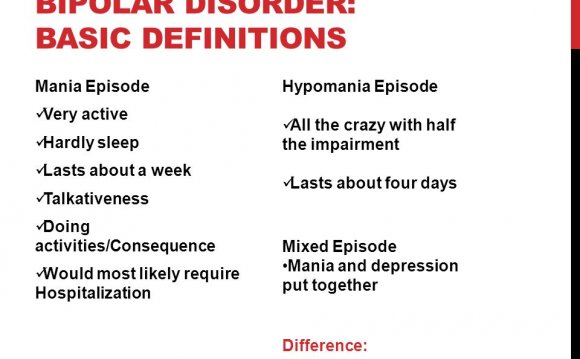
Most people with bipolar disorder, even those with the most severe forms, can achieve substantial stabilization of their mood swings and related symptoms with proper treatment. Because bipolar disorder is a recurrent illness, long-term preventive treatment is strongly recommended and almost always indicated. A strategy that combines medication and psychosocial treatment is optimal for managing the disorder over time.
In most cases, bipolar disorder is much better controlled if treatment is continuous rather than on and off. But even when there are no breaks in treatment, mood changes can occur and should be reported immediately to your doctor. The doctor may be able to prevent a full-blown episode by making adjustments to the treatment plan. Working closely with the doctor and communicating openly about treatment concerns and options can make a difference in treatment effectiveness.
In addition, keeping a chart of daily mood symptoms, treatments, sleep patterns, and life events may help people with bipolar disorder and their families to better understand the illness. This chart also can help the doctor track and treat the illness most effectively.
Medications
While primary-care physicians who do not specialize in psychiatry also may prescribe these medications, it is recommended that people with bipolar disorder see a psychiatrist for treatment.
Medications known as mood stabilizers are usually prescribed to help control bipolar disorder. Several types of mood stabilizers are available. In general, people with bipolar disorder continue treatment with mood stabilizers for years. Other medications are added when necessary, typically for shorter periods, to treat episodes of mania or depression.
Lithium, the first mood-stabilizing medication approved by the U.S. Food and Drug Administration (FDA) for treatment of mania, is often very effective in controlling mania and preventing the recurrence of both manic and depressive episodes.
Anticonvulsant medications such as valproate or carbamazepine also can have mood-stabilizing effects and may be especially useful for difficult-to-treat bipolar episodes. Valproate was FDA-approved in 1995 for treatment of mania. Newer anticonvulsant medications, including lamotrigine, gabapentin, and topiramate, are being studied to determine how well they work in stabilizing mood cycles. Anticonvulsant medications may be combined with lithium, or with each other, for maximum effect.
Children and adolescents with bipolar disorder generally are treated with lithium, but valproate and carbamazepine also are used. Researchers are evaluating the safety and efficacy of these and other psychotropic medications in children and adolescents. There is some evidence that valproate may lead to adverse hormone changes in teenage girls and polycystic ovary syndrome in women who begin taking the medication before age 20. Therefore, young female patients taking valproate should be monitored carefully by a physician.
Women with bipolar disorder who wish to conceive or who become pregnant face special challenges due to the possible harmful effects of existing mood stabilizing medications on the developing fetus and the nursing infant. Therefore, the benefits and risks of all available treatment options should be discussed with a clinician skilled in this area. New treatments with reduced risks during pregnancy and lactation are under study.
Research has shown that people with bipolar disorder are at risk of switching into mania or hypomania, or of developing rapid cycling, during treatment with antidepressant medication. Therefore, mood-stabilizing medications generally are required, alone or in combination with antidepressants, to protect people with bipolar disorder from this switch. Lithium and valproate are the most commonly used mood-stabilizing drugs today. However, research studies continue to evaluate the potential mood-stabilizing effects of newer medications.
Atypical antipsychotic medications, including clozapine and ziprasidone, are being studied as possible treatments for bipolar disorder. Evidence suggests clozapine may be helpful as a mood stabilizer for people who do not respond to lithium or anticonvulsants. Other research has supported the efficacy of olanzapine for acute mania, an indication that has recently received FDA approval. Olanzapine may also help relieve psychotic depression.
Share this Post
INTERESTING PSYCHOLOGY VIDEO













